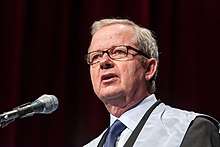Jens Nørskov
Jens Kehlet Nørskov (born September 21, 1952, in Denmark) is the Villum Kann Rasmussen professor at the Technical University of Denmark.[1] He is a Danish physicist most notable for his work on theoretical description of surfaces, catalysis, materials, nanostructures, and biomolecules.
Education
Nørskov earned his MSc in Physics and Chemistry in 1976 and his PhD in Theoretical Physics in 1979 from the University of Aarhus Denmark under B. I. Lundqvist.[2]
Academic career
Nørskov is known for his theoretical work on description of surfaces, catalysis, materials, nanostructures, and biomolecules. His work on computer-based heterogeneous catalysis has in several instances led to the development of new ideas for catalysts for e.g. ammonia synthesis and fuel-cells.[3][4][5] He holds honorary doctorates from the Eindhoven University of Technology,[6] the Norwegian University of Science and Technology (NTNU), and from the Technical University of Munich (TUM).[7] He is a member of the Royal Danish Academy of Sciences and Letters,[8] the Danish Academy of Engineering,[9] Academia Europaea [10] and a foreign member of the US National Academy of Engineering.[11]
Following his PhD, he served as a research fellow, postdoctoral associate and staff scientist at various institutions – including IBM T.J. Watson Research Center, and Haldor Topsoe. In 1987, Norskov began serving as a research professor at Technical University of Denmark and was named professor of theoretical physics in 1992. In June 2010, he moved to Stanford University to become the Leland T. Edwards Professor of Chemical Engineering and the Founding Director of the SUNCAT Center for Interface Science and Catalysis. In July 2018, he moved back to the Technical University of Denmark to hold the Villum Kann Rasmussen Chair.[12] Nørskov is currently the chair of the Danish National Research Foundation.
Books
- Fundamental Concepts in Heterogeneous Catalysis, Jens Nørskov, Felix Studt, Frank Abild-Pedersen, Thomas Bligaard.[13]
- Chemical Bonding at Surfaces and Interfaces, edited by Anders Nilsson, Lars G.M. Pettersson, Jens Nørskov.[14]
- Fuel Cell Science: Theory, Fundamentals, and Biocatalysis, edited by Andrzej Wieckowski, Jens Nørskov.[15]
Scientific publications
References
- "DTU Department of Physics: Jens Nørskov".
- "Jens's CV"
- "Nørskov receives the Somorjai Award". Archived from the original on 2012-01-29.
- "Cheaper catalysts designed by Computer".
- "Hydrogen production". MSNBC.
- "TU/e honorary doctorate". Archived from the original on 2012-03-30.
- "NTNU's overview of honorary doctorates" (in Norwegian). Archived from the original on 2014-09-10.
- "Royal Danish Academy of Sciences and Letters".
- "Akademiet for de Tekniske Videnskaber" (PDF).
- "Academia Europaea".
- "US National Academy of Engineering".
- "DTU professorship for top researcher from Stanford University".
- Fundamental Concepts in Heterogeneous Catalysis.
- Chemical Bonding.
- Fuel Cell Science.
